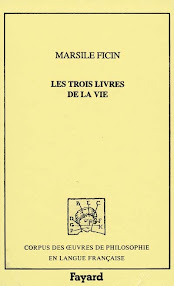Marsile Ficine - Les Trois Livres De La Vie Or De Vita Libri Tres (10.0 MB)
 Book downloads: 138
Book downloads: 138
The De vita libri tres or Three Books on Life was written in the years 1480-1489 by Italian Platonist Marsilio Ficino. It was first circulated in manuscript form and then published in 1489. It was constantly in print through the middle of the seventeenth century. De vita is a curious amalgam of philosophy, medicine, "natural magic" and astrology, and is possibly the first book ever written about the health of the intellectual and its peculiar concerns. Alongside beautiful passages explaining the immortality and divine source... More >>>Book can be downloaded.
Note that, unfortunately, not all my books can be downloaded due to the restrictions of copyright. However, most of the books on this site do not have copyright restrictions. If you find any copyright violation, please contact me at  . I am very attentive to the issue of copyright and try to avoid any violations, but on the other hand to help all fans of magic to get access to information.
. I am very attentive to the issue of copyright and try to avoid any violations, but on the other hand to help all fans of magic to get access to information.
If you are having difficulty downloading books, or you are looking for a book that is not on the site (but maybe it is in my home library), please write me a email to

and I will try to help, I can send the book by e-mail
darkbooks.org began in early 2008 I am happy to donate my time to providing you this resource, I would also like to note, that, although I try, I do not always have enough time to deal with the site, including, unfortunately, I do not always have time to answer all letters, because I have to earn money for a living. If you can financially help me, it would free me from the worries of earning money for living, perhaps partially, but ideally completely, then all 100% of my time could be devoted to the site. Also I do pay monthly web server/files storage and hosting costs to keep this site on the air. Please consider making a donation to help me continue this activity and devote more time to it or at least offset the cost of paying for storage/hosting. Even a small contribution helps!
The De vita libri tres or Three Books on Life was written in the years 1480-1489 by Italian Platonist Marsilio Ficino. It was first circulated in manuscript form and then published in 1489. It was constantly in print through the middle of the seventeenth century. De vita is a curious amalgam of philosophy, medicine, "natural magic" and astrology, and is possibly the first book ever written about the health of the intellectual and its peculiar concerns. Alongside beautiful passages explaining the immortality and divine source and nature of the soul, there are astrological charts and remedies, sly speeches from various Greek gods arguing with one another, philosophical digressions, hair-raising medieval prescriptions for various ills, attempts at reconciling the Neoplatonism of Plotinus with Christian scripture, and magical remedies and talismans.
Ficino was one of the major philosophical voices of the Italian Renaissance, but he was also a physician, and the son of a physician. De vita is an example of the medical thinking of the early Renaissance, steeped in Galen and Hippocrates and the theory of the four humors and their attendant Aristotelian qualities (e.g., hot, cold, moist,dry), but also beginning to align this viewpoint with the awakening sense of the archetypal significance of the pagan gods, derived from the first exposure in the West for many centuries to the dialogues of Plato and to the Hermetica. (Ficino was the first translator of Plato into Latin.) The result--particularly in the third book--is a work which takes the pagan Classical god-archetypes quite literally, and personifies them with the planets which are named for them. For Ficino, the planets affect the tenor and vigor of the intellectual's mind and the health of his body. But the main thrust of de Vita is the notion that there are remedies and balances that can be undertaken to mitigate their effect--in fact, to change the temper, even the fate, of a human being. In this regard, Ficino shows his deeply humanist point of view, which sets him apart from earlier writers.
The book's thrust depends on the tension Ficino tries to resolve intellectually--a tension that is typical of the syncretism of much of the early Renaissance--between Classical philosophy and religion and Christian belief. By filtering both through cosmology of Plato, Ficino attempts to reconcile these world-views. An English translation by Charles Boer of the De vita was published in 1982. A critical edition and English translation of the Three Books on Life, with the Latin on one page and the English translation on the facing page, with Introduction and Notes, by Carol V. Kaske and John R. Clark, was re-published in 1998 and again in 2002 by The Arizona Center for Medieval and Renaissance Studies, in conjunction with The Renaissance Society of America.



 Book downloads: 138
Book downloads: 138
 . I am very attentive to the issue of copyright and try to avoid any violations, but on the other hand to help all fans of magic to get access to information.
. I am very attentive to the issue of copyright and try to avoid any violations, but on the other hand to help all fans of magic to get access to information.
 and I will try to help, I can send the book by e-mail
and I will try to help, I can send the book by e-mail